The good news is test anxiety is highly treatable and can be prevented with just a little management.
If you are experiencing discomfort regarding your upcoming board certification exam or any test you might be taking, know that you are not alone. BCEN has turned to the experts at Sandstone Psychological Practice, an authority on test anxiety, to outline the best practices in recognizing and handling test anxiety.
On this page, we provide:
- How to recognize causes and symptoms of test anxiety
- Dozens of free tips and suggestions for how to manage test anxiety before, during and after the test
- Information about a new self-guided online course to help you manage test anxiety so that it works for you instead of against you
So, read on and best of luck in your preparations.
Also, be sure and join the Test Anxiety Facebook Group, organized by our partners at Sandstone!
New Tackling Test Anxiety Guided Online Course
We’re pleased to introduce a new online test prep course produced by our partners at Sandstone, “Tackling Test Anxiety: A Guided Online Course.” This web-based class is an easy way to learn how to manage anxiety, with tactics that address:
- Increasing your confidence in advance of your exam
- Identifying the true source of your anxiety
- Dealing with intrusive and disruptive thoughts, feelings and emotions
- Managing the impact that stress and anxiety has on your physical well-being
At BCEN, we’re also committed to helping you excel in your emergency nursing career, achieve your credential, and expand your impact. The course has been reduced to $39.99 (regularly priced at $150) to any nurse preparing to take their board certification exam.
To take advantage of this exclusive offer follow these simple steps:
- Click here to purchase the course
- Add the course to your shopping cart
- Complete and pay for the course
*The price of the course may vary due to occasional promotions on the Udemy online video course site.
How to Identify and Manage Test Anxiety
It is perfectly natural and a common human reaction to experience some anxiety when thinking about taking a test or during the test itself. In fact, a certain level of anxiety can actually help you perform better on a test! So, why not stop reading here and go take a nap rather than learning about managing test anxiety, you ask? The reason is that too much anxiety about a test can become a large problem.
Problematic test anxiety can include, but is not limited to:
| Going Blank | Upset Stomach | Racing Heart |
| Freezing Up | Pounding Headache | Shortness of Breath |
| Racing Thoughts | Dizziness | Sense of Failure |
| Wanting to Give Up | Not Finishing the Test | Crying |
When a person is dealing with several of these symptoms, effectively preparing for the certification exam and being able to focus during exam-time is a tall order! At that point, the exam becomes a measure of your level of anxiety, rather than your experience and knowledge as a nurse. While a little test anxiety can be helpful, too much test anxiety that goes unmanaged can actually interfere with your ability to perform on the test and can even prevent you from earning your certification. Performing poorly on a test can then lower overall self-esteem and reinforce test anxiety.

The good news is that test anxiety is highly treatable and can be prevented with just a little management!
Within this document, we provide suggestions for treatment below and lay out key information that can help you get started. So, read on and best of luck in your preparations.
-
What Causes Test Anxiety
Test anxiety is too commonly misperceived and disregarded as a simple worry that can be remedied if you “just take a few deep breaths and think positively.” It commonly gets minimized and overlooked rather than being acknowledged as the serious issue it can be. We know now that test anxiety can be very complex, deeply rooted, and may represent just the tip of an iceberg. There are many causes of test anxiety and the cause(s) can be different for each person. One or more of these causes can then trigger a flight, fight, or freeze response that causes adrenaline to flood your body, which reduces your ability to focus on the test. Do any of these common causes of test anxiety resonate with you?
Common Causes Common Thoughts with this Cause Fears about how others will view you if you don’t pass the exam My supervisor will think I am not smart and my peers will be very disappointed in me. What will my friends say? What will others think about me? Concerns about your own identity and self-image What does this mean about me if I don’t get a good grade? Does it mean I’m not smart anymore? Worries about the consequence for your future of getting a low grade / not passing the exam If I don’t pass this test, I won’t be hired at that new job. I won’t get a pay increase. My reputation as a nurse will be ruined! Not feeling prepared for the test I didn’t have any time to study and I barely skimmed the study material. I won’t be able to answer the questions! Previous trauma experiences related to academic work and previous tests History will repeat itself and I will fail this test, as well. I just know how this is going to turn out. ADHD and/ or Learning Disabilities (e.g., dyslexia) I need more time than other students. I’ll never be able to focus. What if my reading disability impacts my ability to pass the exam? -
Symptoms of Anxiety
How do you know if you have test anxiety? Well, test anxiety can manifest in a variety of ways, often looking differently from one person to another. It can be helpful to think of the symptoms in terms of physical, emotional, and cognitive symptoms (i.e., body, feelings, and thoughts). For some individuals, they may notice mostly physical symptoms (e.g., heart racing, dry mouth), whereas others might notice thoughts like “I’m going to fail. No one will hire me. Why am I even studying for this thing when it won’t make a difference?”
Common Physical Symptoms
Dizziness Shortness of Breath Upset stomach Sweating Heart Palpitations Pulsing in the Ear Trembling or twitching Racing Heart Dry Mouth Weakness in legs Chest Pain Nausea Tunnel Vision Headaches Vomiting Common Emotional Symptoms
Various distressing emotions can be tied with test anxiety. Some of the most common include: nervousness, irritability, anger, frustration, fear, exhaustion, hopelessness, sadness, crying, and generally feeling “stressed out”.
Common Cognitive Symptoms
Oftentimes, the thoughts of people with test anxiety are “worry thoughts” or thoughts that can be self-defeating. Here are some common thoughts that have been described by people with test anxiety.
- I don’t know why I’m studying. I’m going to fail anyway.
- I’m not good at taking tests.
- I shouldn’t even try to get this certification.
- I need to get out of here.
- I’m going to fail this test and then never be able to get a good job.
Rather than being motivating, these thoughts serve to defeat someone before they have even taken the test. As it turns out, these thoughts are usually just not accurate and are called cognitive distortions. Cognitive distortions refer to inaccurate, extreme thinking patterns that affect the way one views reality. Typically, these thoughts serve to increase anxiety instead of combat it. Here are a few examples of common cognitive distortions associated with test anxiety:
- All-Or-Nothing Thinking – Only seeing things in black-and-white categories. For example, if you do not know the answer to one question, you assume you will not know the answers to any of the questions.
- Disqualifying the Positives – Rejecting positive experiences by insisting that they don’t count for some reason. For example, even if you have passed three practicum tests, you believe they don’t count and you’ll still fail the actual test.
- Catastrophizing – Exaggerating the importance of things. For example, your friend mentions a test question that she encountered on a practice test that you did not know the answer to and you believe that this means you are not ready to take the actual test.
Which symptoms of test anxiety do you experience most frequently? Identifying how your test anxiety manifests is an important component to strategizing how to reduce it. For example, if your test anxiety is mostly physical, then you can aim strategies at reducing your physical experience of anxiety.
Tips for Reducing Anxiety Before, During, and After the Test
Test anxiety can occur before and after the test, not just during. This means that it’s important to target your management of anxiety during each of these timeframes. While experiencing anxiety symptoms even before the test may seem like a unique form of torture, the good news is that it provides opportunities and time to intervene on the anxiety symptoms long before you step into the testing facility.
Below, we provide you with our top tips for combatting test anxiety. This list will help you gain insight into your personal sources of test anxiety and give you instructions regarding how to reduce your anxiety to a manageable and useful level. Practice and repetition are two key components to mastering test anxiety symptoms, so we encourage you to review this list often and practice as much as you can.
Prior to Exam Day
Consider the test a performance and consider the preparation prior to the exam your rehearsal. Most thespians will tell you the best way to ensure a good performance is to rehearse frequently and in the same conditions as you perform. What does this mean for test anxiety, you may be wondering? It means your preparation before the test greatly impacts your actual test-day performance. We recommend setting your stage carefully and strategically to reduce anxiety.
-
1
Prepare thoroughly for the exam.
Give your all in preparing. Knowing that you gave adequate time and effort to preparing for the exam can reduce your anxiety as you walk into the test. This may include:
- Know the test format and content
- Create a study plan and complete study guides
- Join a study group
- Use tutoring
- Talk with professionals, mentors, or professors in the field to make sure you understand the information
- Talk to peers who have taken the test before and ask for recommendations on how to prep for the test
-
2
Make a Study Schedule and Avoid Cramming.
Don’t listen to those who say they only studied right before the exam; cramming is not the most effective or only way to prepare for an exam! Although some find cramming motivating, it can also cause an overload of stress.
- Use a calendar to block off study times, working backward from the date of the test
- Treat study times as protected times that cannot be usurped by other tasks like napping or watching the latest HBO saga
- Aim to spread your studying out across weeks (maybe even months), building upon what you have mastered and learned each study session
- Give yourself time to review
- Overestimate the time you will need to study, rather than underestimate
- Sometimes studying with a group helps hold you accountable for keeping a set time in your schedule
-
3
Keep Study and Test Environments Similar.
In general, learning happens best when you learn information in many different environments. However, it can be a helpful tool for jogging your memory during a test if you use conditioned stimuli while studying. In other words, keep conditions as much the same as possible while you are studying as on the test day. For example, wear the same shirt or clothing during your study sessions as on the test day.
-
4
Engage in Movement/ Exercise.
Exercise helps in several ways: increasing the feel-good endorphins that combat anxiety and depression, burning off excess energy, and providing time to set aside general stress by focusing only on the task at hand.
- Find movement and exercise that you love (e.g., yoga, tai-chi, running, break-dancing, etc.), not something that is a burden to you
- Aim for movement that increases your heart rate
- Pencil-in exercise time in advance that is protected time (just like your study time)
- Use a few minutes at the end of your exercise time to think about the test and practice positive thinking so that you associate the test with feel-good endorphins and positivity
-
5
Get Sleep.
Sleep tends to be the first thing that people sacrifice when they are strapped for time. However, sleep is essential for retaining information, concentration, and regulating stress- all things you will need prior to and on test day!
- Set a consistent sleep schedule for the length of time you are studying for the test (aim for about 8 hours of sleep per night)
- Although you will be tempted to review as much information as possible prior to the test, do not let this mini-cram session impact you getting the number of hours of sleep you need to function just before test-day
- Create a relaxing sleep routine to help you fall and stay asleep (e.g., no electronics for the half hour prior to sleep, drink a relaxing tea like chamomile, eliminate caffeine from early afternoon on, get in comfortable pajamas, and practice deep breathing)
-
6
Focus on Getting Good Nutrition.
Just like sleep, nutrition tends to be sacrificed for something fast, easy, and yummy when people are busy. Many times, these foods are the opposite of good nutrition.
- Really focus on getting good daily nutrition during your study-prep time as it aids with brain function, energy, and concentration
- Aim for Omega-3’s, foods high in antioxidants, complex carbohydrates, and quality proteins
- Rather than focusing on changing your whole diet or depriving yourself of foods, practice incorporating nutritious foods into your diet daily
- Ideal foods that increase memory include:
eggs nuts blueberries fish for Omega-3’s yogurt coffee beans whole grains (oatmeal) dark chocolate water beans (red, pinto, black) apples prunes lean meats low fat milk vegetables -
7
Identify Negative Thinking and Practice Thinking Positively.
It is important to think positively about the test because it increases your sense of control and reduces anxiety. Negative thinking can undermine your confidence and reduce motivation as you prepare for and take the test.
- Pump yourself up with encouraging statements like, “I can do this!” and “I’ve got this!”
- Put encouragers on a post-it note and put it on your mirror, in your studying notebook, or in your car where you can see it everyday
- Find inspiring quotes that speak to your test-taking journey
- Listen to inspiring or energizing music routinely
- Monitor the thoughts you are having related to the test, yourself, and/or your abilities. Then ask yourself, “Is this thought helping me? Is this thought really true?” If it’s not helpful or entirely true, practice exchanging that thought with a thought that is helpful and positive (even if you don’t believe it at first). The more you practice, the better you will get at it. Here are some examples:
Example. If I fail this test, I will never get the nursing certification. ➜ Actually, if I fail this test, I can take it again in 90 days.
Example. It doesn’t matter how much I study, I will probably fail the test. ➜ Actually, I will follow my study plan and get the support I need, and this will help me pass this test.
Example. If I fail this test, it reflects on me, and everyone will be so disappointed in me. ➜ Actually, this is just one test and it doesn’t take away any of my prior accomplishments. My friends and family won’t see me differently because of this one test. I will just try again and they will be proud when I do pass this test.
-
8
Strive for a Relaxed State of Concentration While Studying.
The more you practice being relaxed when you are not stressed, the more you are able to relax during key times when you are anxious (such as during the real test). Routinely practice the following:
- As you sit down to study, take long, deep breaths in through your nose and imagine your belly is a balloon that you are filling with air, then breathe out through your mouth. Take more deep breaths in the middle of your study time, and then again at the end
- Listen to soothing, relaxing music during study times. Listen to this on the way to the test and think of those melodies during the test. Take some time during studying to visualize a relaxing, peaceful scene
- Stretch and breathe deeply while studying and during the test
- Practice taking a deep breath as you transition from study topic to study topic as this could be a good mental reset that you can also use during the test as you move from question to question on the actual test
-
9
Routinely Engage in Relaxing Activities.
The best way to combat test anxiety is not to try to reduce anxiety, but rather to focus on increasing relaxation. Routinely incorporate relaxing activities into your week, such as the following:
- Deep Breathing
- Massages
- Remind yourself to “SLOW DOWN” in daily activities as moving fast increases adrenaline and anxiety
- Go do something fun (e.g., movie, hang out with friends)
- Use your senses of sight, smell, touch, taste, and hearing to mindfully do an activity (For example, rub lotion onto your hands slowly and notice the smell and feel of the lotion. Eat a treat slowly while noticing the flavor, texture, and smell of the treat.)
- Go for a walk or swim
- Read a good book
- Take relaxing bubble baths
-
10
Reward Yourself.
Think of test preparation and managing test anxiety as a marathon, rather than a sprint. In this marathon, you are working very hard and incorporating many study sessions into your already busy lives. Give yourself rewards along the way to stay motivated and honor the work you are putting into mastering this test. Some people think they should only reward themselves if and when they pass the test. Challenge this thought and provide rewards more liberally.
- Reward yourself during your scheduled study times with a guaranteed treat after you finish studying (e.g., food, nap, a set number of Netflix shows)
- Get yourself to study by drinking your favorite beverage or having your favorite snack while you study
- Plan larger scale rewards for a solid effort of studying (e.g., massage after a week of study, buying a new outfit after studying)
- Sit down and list out anything you can think of to reward yourself from small to big and use this list to chart out your rewards.
- Plan what your big reward will be for test-day after your take the test, no matter the outcome
-
11
Know Thyself.
Understanding what contributes to your test anxiety is a very important component to reducing the anxiety. One way to get in touch with your anxious roots is to engage in some self-reflection. This insight-oriented work helps you know yourself and provides insight into your difficulties, which is a necessary step for behavior change:
- On a piece of paper, write your thoughts and feelings that come to mind when you think about your upcoming test. Don’t censor; it is important to be honest.
- Ponder the following: Are there concepts you worry you’ll forget? What are your fears associated with the test? What are your hopes with this test? Do you experience any learning struggles, if so, what? Are taking tests difficult for you? Do you have any previous traumatic experiences with test taking? When did your test aversions begin? Do you experience anxiety for all tests or tests that are only content specific (e.g., only on math tests) or format-specific (e.g., essay tests only)?
- Now, examine what you wrote. Are you surprised by your answers? Are there any easy-fixes to your answers (e.g., increasing study efforts for specific content areas, finding out more about the test taking environment, discussing with your supervisor the impact of passing/failing on your career … etc). If so, start combatting those quickly to peel away some of the anxiety build up.
-
12
Visualize Test Day.
We largely fear the unknown. Visualizing what the test will be like can help the unknown become known, and thus less scary. Close your eyes and visualize what the testing experience will be like from start to finish, including driving there. Engage in slow deep breathing and positive thinking as you visualize the scene. The more often you visualize yourself taking the test and using your relaxation techniques, the more likely you’ll actually be relaxed during the real test.
- Try to tour the test facility (or watch the video on the website that shows the testing facilities) and know the test format to more accurately visualize the scene
- Imagine yourself doing well
- Imagine yourself becoming panicky and using your relaxation skills to calm down and continue on to do well
- Imagine yourself seeing the results that you passed. What will you think, say, or do?
- Imagine yourself seeing the results that you did not pass. What will you think, say, or do?
Exam Day
Just like preparing for a marathon, the majority of the hard work happens before the actual test and test day is just about completing that final step and showing off all the work you have done.
-
1
Set the Stage for Success.
- After a good night’s sleep, wake up and do something relaxing like taking a long warm shower, going for a run, and deep breathing
- Eat a nutritious breakfast from the good food list above so that you have energy and are not hungry and distracted during the test. You may be nervous, so keep it light and take a snack
- Review just a little bit of material prior to the test so that you can jog your memory and activate the area of your brain related to everything nursing
- Approach the test with confidence and listen to music on the way to the exam to help you get energized and/ or relaxed
- Say positive things to yourself: “I’ve prepped as much as I can,” “I will do my best,” “I get a treat after the test!”
- Arrive to the testing site well in advance. You will already be anxious and don’t want to add anxiety about being late or not finding the site. Arriving early gives extra time for working through nerves
- Wear a comfortable outfit you have been studying in
- Drink water to help stay hydrated as anxiety can make your mouth go dry
-
2
Use Smart Test-taking Strategies.
- Encourage yourself to “Go Slowly” to reduce anxiety and eliminate careless mistakes
- Read the directions carefully
- Skip a question you don’t know and come back to the question later. This is especially helpful if you blank on something due to anxiety
- Budget your test-taking time
-
3
Practice Self-Care and Relaxation During the Test.
Expect that you will experience anxiety. Anxiety does not mean you are not ready or that you will fail. It just means you are human and care about passing this test. Just remember what you’ve been practicing to manage it. Refocus on your coping strategies.
- Breathe deeply
- Close your eyes as needed to “reset”
- Move around in your chair and stretch to relieve tension and increase concentration
- Remind yourself that after your test, you will be getting a reward that you predetermined
- Think about something supportive someone you love might say to you when you feel anxious
- Think positively
- Take a mid-test break to eat a snack and rehydrate if you are feeling fatigued, even if that means that the test clock will continue to run for a few minutes while you reset through a break
After Exam Day
-
1
Expect Anxiety.
Know that anxiety after the test is normal. Experiencing anxiety after test day is just as normal as experiencing anxiety prior to test day, even though you might assume that your anxiety would be all gone. Expecting it can help you tolerate it better.
-
2
Schedule Time to Worry and then Distract Yourself.
It is common to replay parts of the test and wonder about which questions your answered correctly or incorrectly. This can get exhausting and sometimes people will start to assume they answered something incorrectly (even though they were actually correct). Especially if you didn’t pass the test, this anxiety (along with disappointment) can become intense.
- Remind yourself that you did your best at the time and hindsight is 20/20
- Limit your worry time to a specific time frame (e.g., 30-40 minutes) and then do something distracting
- Remind yourself that you cannot remember the exact question or phrase, so don’t assume you answered something incorrectly
-
3
Talk about the experience with supportive friends, family, and co-workers.
Talking about the test with others can help you process what the experience was like. Review with them what parts went well, how you managed your anxiety, and the parts that did not go so well.
-
4
Reward yourself.
Make good on the reward you promised yourself, no matter the outcome
-
5
Get extra rest.
Taking a test drains our energy, so be sure to get extra rest, comfort, and relaxation
Other Suggestions for Help
We hope that by reading and practicing our top strategies for reducing test anxiety, you will begin to experience some relief. However, some people find that they need additional, more personalized assistance. Here, we provide some next steps for addressing your test anxiety.
-
1
Examine the effectiveness of your study strategies.
One way to judge the effectiveness of your studying is to compare your scores from when you started studying to your scores a month or two later. If there are no improvements, perhaps you aren’t addressing the material appropriately, which in turn may be creating anxiety and poor test performance. To aid in your study strategies, we recommend that you:
- Seek tutoring or academic assistance (e.g., study with a friend, talk to others who have taken the test)
- Diversify your study approach (e.g., don’t just stick to taking pre-tests, also do some reading, create some notecards, etc.)
-
2
Read self-help books on test-anxiety.
A basic search online or at a book store can lead you to some self-help books on test anxiety. Make sure to budget adequate time for this type of self-study.
-
3
Take our online guided course for managing test anxiety.
If you found these top tips useful, consider taking Sandstone Psychological Practice’s online course that goes more in depth and provides a guided tour to managing test anxiety, personalized to your needs. We are licensed psychologists who have a private practice in Nevada. We specialize in test anxiety and are dedicated to helping students and test-takers take control of their anxiety so that they can perform their best and achieve their educational goals. Visit www.udemy.com for more information about the course.
-
4
Seek individual or group counseling.
Test anxiety is a particular type of anxiety and may require some individualized treatment. A psychologist or therapist could work with you one-on-one to better understand and address your test anxiety. If you are interested in finding a therapist, you can search www.PsychologyToday.com for providers in your area. If you have insurance, you can also contact your insurance company for a list of providers in your area. We also recommend that you discuss with your therapist the following:
- Medication management for your treatment of anxiety
- Consider examining underlying learning problems that could be exacerbating your anxiety.
-
5
Implement needed accommodations.
If you have a documented disability that affects how you take tests, you may be eligible for accommodations. Common accommodations include: extended time on the test, large-type exams, a reader to dictate questions, and taking the exam in a distraction-free room. Take the steps to request accommodations by visiting the testing site webpage and following instructions for requesting accommodations. If you believe you have a non-diagnosed disability, plan well in advance (many months) to visit a psychologist who can help you determine whether you have a diagnosable disability.
-
A Special Note for Repeat Test Takers
After hours and hours of preparing for the test only to not pass can be incredibly confusing and emotionally exhausting. Many questions are probably bouncing through your mind: Why did I not pass? Should I try again? Why didn’t I study more? How could I fail when I studied as much as I did? I’m so tired!
Before jumping into answering your questions or moving onto what you need to do next, take a minute (or a few weeks) to allow yourself to rest and reset from such an emotional process and outcome. Taking a break allows you to come back refreshed and renewed. Rather than thinking of this as repeating something you have already done, think of this as a new part of your journey that will get you to your goal.
There are many reasons why someone may not pass a big exam like this. And, it is important to engage in honest reflection regarding how your test performance could be improved (e.g., needing additional studying, needing reductions in anxiety, needing special accommodations). By reflecting, you begin outlining your re-approach, taking with you many valuable lessons from your first test attempt.
We find that second-time test takers sometimes experience even more anxiety during their second attempt than their first, usually because of the increased stress, frustration, and struggle that they have experienced. But, that does not have to be the case.
First, let’s focus on the many advantages of being a second-time test taker. For example, you know personally what this test looks like and what it feels like to take it. You also have familiarity with the testing site and procedures. In terms of studying, you are building upon your previously attained knowledge and not starting from scratch. By focusing on these advantages, you can begin to reduce some of the anxiety that is building up and try to approach the test with a clear, new mindset.
Second, let’s embrace what we cannot change and learn from it. Failings are learning opportunities and an inevitable part of life. Often, people hear the word “fail” and begin experiencing a flood of negative emotions: embarrassment, sadness, depression, hopelessness, and anxiety. However, failing only means a single test was not passed (it does not mean anything about your intelligence, ability, or worth). Just as Thomas Edison once said, “I have not failed. I’ve just found 10,000 ways that don’t work.”
Take the time to rest, reflect, and reset. And, when you feel ready, re-approach this test. Remember, you are not starting from scratch, you just need to finish your last mile and cross the finish line.
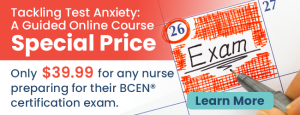
 Certified Emergency Nurse
Certified Emergency Nurse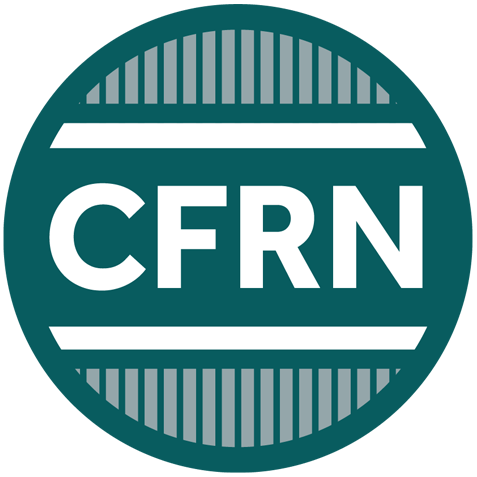 Certified Flight Registered Nurse
Certified Flight Registered Nurse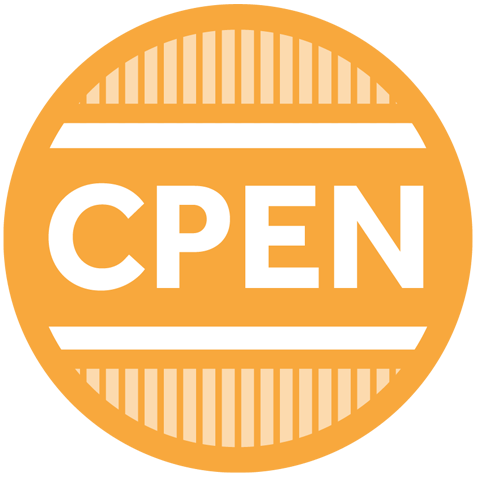 Certified Pediatric Emergency Nurse
Certified Pediatric Emergency Nurse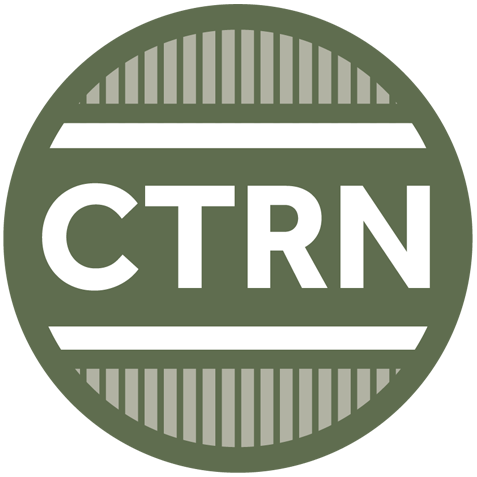 Certified Transport Registered Nurse
Certified Transport Registered Nurse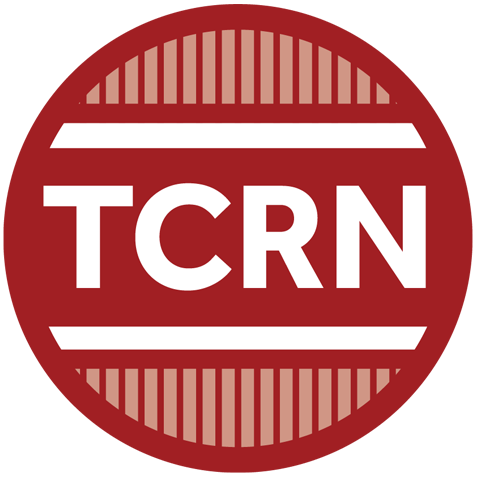 Trauma Certified Registered Nurse
Trauma Certified Registered Nurse Burn Nursing Specialty Certification
Burn Nursing Specialty Certification